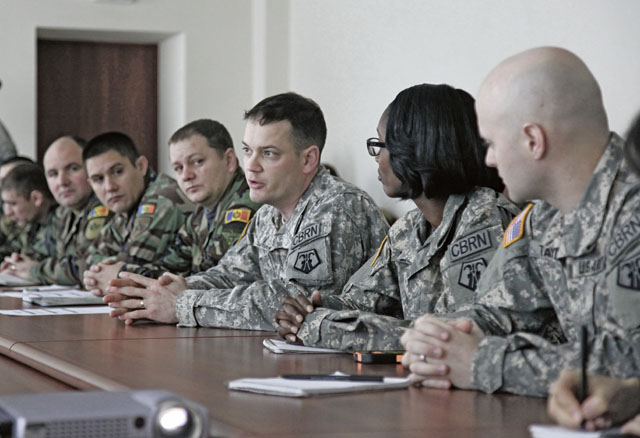
CHISINAU, Moldova — Soldiers from the 7th Civil Support Command’s 773rd Civil Support Team participated in a Chemical, Biological, Radiological and Nuclear capabilities brief with the Moldovan army’s Nuclear, Biological, Chemical Company Dec. 3 to 5.
Both units participated in the information exchange as part of the U.S. European Command’s building partner capacity program.
The 773rd CST provided information on their unit operations, medical, analysis and survey techniques.
“We’re here to conduct a capabilities brief,” said Sgt. 1st Class Ludwig Schweinfurth, medical NCOIC with the 773rd CST, 7th CSC. “To describe to the Moldovan army what our capabilities are as a CBRN response unit as well as learn what theirs are and what their mission set is.”
On Day One, Sgt. 1st Class Yabronda A. Battles, a training and operations NCO for the 773rd CST, 7th CSC, briefed the Moldovan army Nuclear Biological Chemical Defense Company on the 773rd CST’s operational framework, mission, structure, personnel, training and equipment.
“So far it’s going OK,” Battles said.
The Moldovan soldiers weren’t shy during the three days of discussion as they peppered the 773rd CST Soldiers with questions on CBRN tactics, techniques, monitoring vital signs, procedures and equipment.
“With my brief specifically on the medical and analytical sections of the 773rd it was to describe to them what my role on the team is as the med(ical) NCO — what I do, how I function, what my responsibilities are — it’s providing new ideas for them to safely conduct their mission and vice versa. We learn from them as well,” Schweinfurth said after his presentation on Day Two. “We’re dealing with a post Soviet-era state here and they have issues that have been accumulating over decades and now they’re taking steps to correct them. And from what we understand, it was seemingly insurmountable but they’ve made tremendous headway.”
“It looks like they’ve made great strides in trying to develop the CBRN unit,” said Maj. Christopher Rogers, Bilateral Affairs Officer, Office of Defense Cooperation, U.S. Embassy-Moldova. “The Moldovan military is very much getting in line with its regional partners in terms of its development, trying to get away from the old Soviet model of how things were handled. Where they were to where they are now, they have come a long way.”
“Hopefully as training opportunities arise we’ll have the opportunity to work with them again and either work as a partnership or even a mentorship-type relationship in both directions,” Schweinfurth said.
The 773rd CST’s visit is a follow up to an earlier EUCOM event to assist the Moldovan military in the development of their organic CBRN response capability and planning.
“Phase One was an initial assessment (of Moldova CBRN capabilities) that was done by a CST from the North Carolina National Guard back in 2012,” Rogers said. “Phase Two is building on the assessment that was done to further develop the (CBRN) capabilities. There probably will be a couple years worth of engagements to help the Moldovan CBRN unit get to a level where they’re able to adequately handle hazardous waste materials.”
EUCOM’s goal is to partner with the Moldovan army until they get to the point “where they’re self sufficient to handle issues like this,” Rogers said. “Where, if there is a CBRN-type event, depending on the scale, Moldova could handle it on its own. The goal is always to get the Moldovans to the point where they’re self-sufficient to handle (CBRN event) issues.”
“I learned many things today about the equipment the 773rd CST uses, the methods that they use in their work,” said Moldovan army 2nd Lt. Ivan Draghici, commander, Decontaminate Platoon, NBC Defense Co.
On the final day, Sgt. Brandon Taylor, survey team member, 773rd CST, 7th CSC, briefed on survey team operations.
“It’ll give the Moldovan army a little insight into how we operate and how we would go down into a contaminated area,” Taylor said.
“This training is important for me and my Company because we acquire new knowledge about NBC protection,” said Moldovan army Capt. Andrian Rogojin, commander of NBC Defense Co. “All the help that the United States has been providing to us has been very beneficial for us. So this event is very beneficial to us because the knowledge that we acquire during this event we will be able to use in our activity throughout the Republic.”







